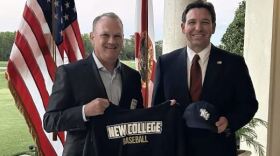What could become the nation's first fish farm in federal offshore waters has been proposed for 45 miles off Sarasota in the Gulf of Mexico. And it is rousing the ire of some fishermen and environmentalists.
The pens would be home to 20,000 Almaco Jack fish, which are similar to amberjack, a popular food and sports fish. It would be a pilot project for Kampachi Farms, based on Hawaii’s Big Island.
Marianne Cufone of Marathon is executive director of the Recirculating Farms Coalition. The non-profit group was formed to oppose offshore aquaculture. She noted offshore farms in Washington State were closed after more than 300,000 salmon escaped from pens. Some had an exotic virus that infected wild fish stocks.
"The pens are flow-through, meaning anything that gets added to the fish - for example antibiotics, or fish waste, is all going into our natural waters," she said. "And doing so in a concentrated location."
The coalition's website states: "Open ocean fish farms have large, floating cages that cram thousands of fish into massive net pens. The farmed fish and cages are often treated with antibiotics and other chemicals that can flow into the ocean. Those chemicals, as well as escaped fish, can disrupt wild ecosystems."
Hallie Templeton, Senior Oceans Campaigner for Friends of the Earth, said "The EPA is failing coastal communities everywhere by allowing this project to move forward in the Gulf. This fish farm will not only hurt Sarasota’s local economy and communities, it will impact the entire Gulf ecosystem and harm native fish throughout the region.”
The company proposing the project says it would be far enough into the Gulf to dilute any byproducts. They say offshore aquaculture is one way to increase the nation's supply of seafood.
The fish would be hatched from eggs in tanks on shore and transferred to the open ocean pen as fingerlings. The company's founder has said farms that are far offshore, in strong currents, don’t create pollution problems like fish farms in shallow waters closer to shore.
“America needs to begin accepting responsibility for producing our own seafood,” said Neil Anthony Sims in an interview with UPI. “It’s an economic problem and a moral problem. We are essentially eating other people’s lunch, and they won’t let us do that much longer as nations like China and India get wealthier.”
The federal EPA is taking public comment on the proposal through Sunday, Sept. 29.
Copyright 2020 WUSF Public Media - WUSF 89.7. To see more, visit . 9(MDAyMTYyMTU5MDEyOTc4NzE4ODNmYWEwYQ004))








